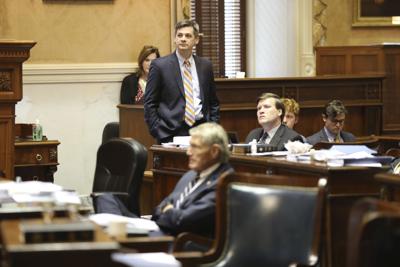COLUMBIA — Statehouse negotiators reached a late session agreement on a liquor liability insurance reform package May 6, offering the state's hospitality and food and beverage industry a glimmer of optimism that proponents hope will stave off looming uncertainty for the state's bars and music venues.
The near end-of-session agreement between the state House and Senate embodies weeks of work between legislative leadership after a weeks-long stalemate over reforms to the state's joint and several liability laws.
How did we get here?
The compromise comes several months after a show-of-force by statehouse Republicans in support of a sweeping tort reform bill to address issues in state law where a defendant could be found 100 percent liable for damages in cases where they were only partially at-fault.
That issue, a favorite of major industries, has been lingering in the legislature for years amid concerns of spiking insurance rates across multiple industries.
It took on new meaning with a recent surge in insurance costs for liquor liability policies around drunk driving incidents, which hospitality industry advocates say has posed an extinction-level risk to the state's bars and taverns.
It also resulted in a major political fight that included a lobbying push by the state's trial lawyers, who saw reform as putting victims of accidents at risk.
What resulted was two approaches.
The House preferred a tailored approach to address issues specific to the state's liquor liability insurance industry, seeking fixes in state law to lower the legal exposure faced by bars and restaurants that may only be partially at-fault in drunk driving cases.
The Senate favored a broad-based approach that would address perceived issues with joint and several liability laws across numerous industries beyond alcohol, such as in trucking, construction and medical malpractice insurance.
What's in the agreement?
House lawmakers insisted in the closing days of the session that ends Thursday (May 8) that they did not have time to consider a broader bill, insisting they would only support legislation specific to liquor.
The Senate, meanwhile, insisted on a version of the bill that addressed issues facing all industries, with Senate Majority Leader Shane Massey telling reporters he was unwilling to remove anything from the bill.
The resulting agreement between both chambers announced May 6 incorporates multiple facets of both bills, creating tailor-made joint and several liability reform language specific to bars and taverns. In return, the House agreed to discuss a broader tort reform bill in the 2026 session.
Main provisions of the agreement include:
- Drunk drivers' inclusion on the verdict forms juries consider which would allow them to be sued for damages.
- Bars and restaurants would be liable for up to 50 percent of a plaintiff's actual damages in drunk driving cases and would only pay damages commensurate to their percentage of fault.
- Reduced insurance coverage requirements for venues where alcohol makes up less than 40 percent of sales.
- Required training for bartenders and servers, with reductions in required insurance coverage amounts for bars that comply.
- Mandated forensic digital age identification systems in bars and restaurants open after midnight.
- Language requiring a bartender or server who "knowingly" overserved an intoxicated individual to be held liable.
The bill also includes broader reforms to the state's tort that would apply to all industries' application of guilt in personal injury cases, including a burden of proof requirement to include a party on a lawsuit, that were favored by groups like the South Carolina Manufacturers Alliance.
What people are saying
Most were favorable.
House Judiciary Committee Chairman Weston Newton, R-Bluffton, said the agreement was to ensure the state's bars and restaurants were "not being held hostage any longer.
Sen. Michael Johnson, R-York, told reporters he was optimistic the bill would result in immediate insurance relief for bars and restaurants should the legislation go into effect on its planned Jan. 1 start date.
Massey, the leading proponent of the Senate bill, supported the bill as well. But he had specific critiques.
The House bill included carveouts for certain individuals, including those who declared bankruptcy or those guilty of reckless negligence, from being fully held liable. He also expressed concerns with the mitigation efforts in the bill that would reduce the state's long-maligned $1 million minimum coverage amount for insurance policies.
But he still plans to support the plan when it comes up for a floor vote May 7.
"It doesn't go nearly as far as I think we ought to go, but it's better than where we are today," said Massey. "And I think that's a big win."


